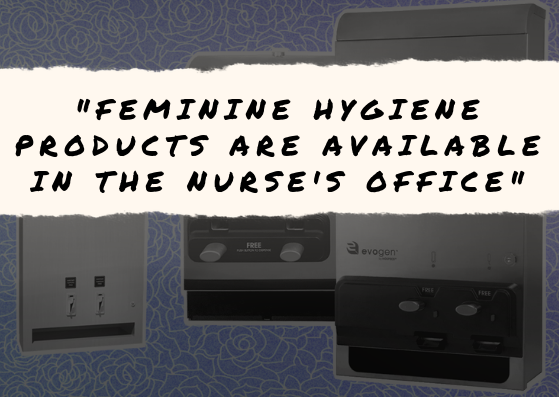District 204 skirts Illinois legislation regarding menstrual products

Illinois legislators passed the Learn with Dignity Act in January. The law requires schools to provide feminine hygiene products in school bathrooms. District 204 is not in strict compliance with the law.
District 204 is knowingly not in strict compliance with a new Illinois law requiring all public and private high schools to provide free tampons and sanitary napkins in school bathrooms. Illinois legislators passed the Learn with Dignity Act in January, but District 204 is not complying with all aspects of the new law and has no plans for future implementation.
The law requires, “The school district shall make feminine hygiene products available, at no cost to students, in the bathrooms of school buildings.” At Metea Valley, students are provided with free tampons and pads, but they are only available in the nurse’s office, not in bathrooms as the law requires.
The school district shall make feminine hygiene products available, at no cost to students, in the bathrooms of school buildings.
— Learn with Dignity Act
Illinois State Representative Linda Chapa LaVia is a chief co-sponsor of the act and worked to pass this legislation. “I thought it was extremely important that we provided these products in a place where young ladies can go to the washroom and get the products for free to help them continue on with their education and not have to worry about ‘I can’t get up because I am bleeding on my seat and no one will help me,’” Chapa LaVia said.
School administrators believe the current policy of providing menstrual products in the nurse’s office is the best option. “Our job is to try and do the best job we can to provide the feminine hygiene products for our students,” Principal Dr. Darrell Echols said. “We are in line with every piece of the law, except the one area that says ‘makes them available in the bathrooms.’ They are available. They are at no cost, but we do not place them in the bathrooms for sanitary and hygiene reasons.”
Some students question the district’s reasoning behind the lack of implementation. “They should put them in every bathroom because if they are able to put the garbage cans to dispose of the products, why can’t they put the pads and tampons in there?” senior Camille Larry said.
In reporting by The Stampede last May, Metea administrators expressed concern about vandalism and product misuse to explain why these products aren’t placed in bathrooms. However, in District 203, where tampons and sanitary pads are provided in girl’s bathrooms, there have been no issues with product misuse.
At Naperville Central High School, hygiene products have been made available to students in restrooms since the second semester of last school year, as a direct result of the act.“I think [the school bathroom] is the easiest place of access. Sometimes you aren’t planning on needing products, so to have it right there is a lot easier and less embarrassing for some students,” Naperville Central assistant principal Carrie McFadden said.
For some students, retrieving products in the nurse’s office is a major inconvenience. “The reality is, there is some girl out there that is too scared to say anything, and she isn’t going to ask to go to the nurse or ask her teacher,” senior India Williams said.
For Chapa LaVia, it is important for students to be able to easily access feminine hygiene products. “Where is the first place these students are going when they have an issue? They are going to the washroom. So it is the most logical place,” Chapa LaVia said.
Last week, Metea administrators placed laminated signs in each Metea girls’ bathroom in an effort to raise awareness about where students can find menstrual products. The signs read, “Feminine Products are Available in the Nurse’s Office.”
Assistant Superintendent for Secondary Education Dr. Louis Lee declined repeated requests for an interview. In a statement provided through district spokesperson Janet Buglio, Lee said, “Building administrators have posted signs in restrooms to make sure students are aware of the availability of feminine hygiene products at no cost to students. Those signs let students know the products are available from the nurse and also accessible inside the bathrooms in the nurse’s office.”
Currently, signs are not displayed in bathrooms at Waubonsie Valley or Neuqua Valley High School, according to students who attend school there.
According to Metea Valley school nurse Elizabeth Grant, the menstrual products in the nurse’s office are funded by a combination of PTSA donations and custodial funds, and are intended for emergency situations. “It is if they don’t have their own supply. I didn’t want it to appear that we are providing for all of the female students in the school and that you can come to school without trying to provide your own,” Grant said.
While the district is not in full compliance, there are no punishments built into this law. “This law doesn’t come down heavy on punishment, it’s just asking for these things to be provided for the female population. It depends on the student body and what kind of relationship they have with the administration and to make sure that they are complying. That’s part of the issue for us as legislators because it is up to the school board to follow through with this for the safety and wellbeing of the children,” Chapa LaVia said.
According to Lee, the district believes it is already in compliance with the law.
Despite the district’s effort to inform students of the location of the products, some Metea Valley students are upset with the lack of compliance. “The law is the law and it was passed for a reason,” Williams said. “No one likes being on their period and schools should do their best to accommodate for the girls that aren’t always prepared.”
Throughout the United States, period-related inconveniences impact students’ education and lives. In a study published by The Independent, research shows that an average of 7% of students between the ages of 10 to 18 has been forced to skip school during their period. “Period related pain is also a leading cause of absenteeism amongst girls in school in the United States, so anything we can do to alleviate period management is worthwhile,” Founder and Executive Director of PERIOD.org Nadya Okamoto said.
According to the Illinois Report Card, over 20% of Metea students are classified as low-income students. The average woman is estimated to spend roughly $62.49 on menstrual products annually, and with 20% of Metea’s student body already financially burdened, some students cannot afford to purchase their own products.
For some students, going to the nurse’s office during class is an inconvenience. In addition, Williams mentioned not wanting to leave class or approach her teacher unless it was an emergency situation. Students can also feel embarrassed about discussing their periods with teachers or once they enter the nurse’s office.
“Keeping products in the nurse’s office creates a barrier to access for menstruators who may not feel comfortable voicing their needs. The time that it takes to find and walk to the nurse’s office and then find where they are located (if available, at all) takes away from valuable potential classroom time. By placing them in the bathroom, these products become readily available to those who need them,” Okamoto said.
For Chapa LaVia, providing products in bathrooms reduces the time spent seeking these products. “It is just the freedom to know that mother nature is happening and I can go right into my washroom and not having to worry about whether or not I have pads or tampons in my backpack,” Chapa LaVia said. “That my school is going to take care of me and respect me enough to provide them there for me.”
Editor’s note: This article has been edited to include an interview with Metea Valley school nurse Elizabeth Grant.

Abbey Malbon is in 11th grade and is a spotlight writer. She is involved with Literary Magazine, Best Buddies and Fresh Connect. She spends her free time...

Kennedy Homan is a person of many different problems. She likes ducks too much, she throws stuffed animals at people in school, and she has no social life...













VOA • Oct 31, 2018 at 12:36 pm
@ Right Vs Privilege
See toilet paper is far cheaper then Menstrual products also everyone uses toilet paper, only girls use Menstrual Products. Also, it’s quite a bit harder to carry a roll of toilet paper around then to throw a tampon/pad into your backpack. Especially if you KNOW when you’ll need one of those two items.
Right vs. Privilege • Oct 30, 2018 at 1:34 pm
@NPC
If having menstrual products is “not a right” but “a privilege”, should schools stop providing toilet paper too and everyone should bring their own in their backpacks?
Both are natural bathroom happenings that aren’t a choice……
NPC • Oct 28, 2018 at 8:08 pm
People seem to forget that it only takes a few individuals to screw everything over. That is what I think is a major problem. Although on paper it doesn’t seem like a big deal. I’m more than 100% sure that some people will take these menstrual products and cause many problems by making a mess and shoving them down the toilet, bless these janitors, who do not need more messes to clean. Don’t forget there is a reason why the girl’s and boy’s locker rooms are locked. People steal, make messes, and don’t always have integrity. Especially since this is high school.
It’s available. It’s being paid for. That is what is important. If someone is truly desperate to go to the nurses, then that means they really need it.
Honestly, if us girls need menstrual products, most of the time we ask our friends. Pretty sure teachers are more than understanding if we need to go down to the nurses to get tampons or pads. I find it kind of pathetic that we are pandered about this. The fact people are complaining. Everything has to perfect. If you can’t have self-responsibilities, then I don’t pity you.
“That my school is going to take care of me and respect me enough to provide them there for me.”
I find this quote disgusting, honestly. It’s so self-righteous. Having menstrual products isn’t a right, it’s a privilege. School is where you are supposed to learn responsibility. Even if money is truly the issue, it is available.
Anon • Oct 28, 2018 at 11:09 am
People who are leaving hate on this article are most likely boys, and they don’t understand the struggle of having to walk down to the nurse’s office only to realize there’s a boy in there whom you know, so you have to walk on by because you can’t ask the reception desk lady in front of him. It’s a serious problem, and everyone should be sensitive to what girls go through.
You can’t make society become okay with talking about feminine hygiene in one day, but you can make it easier on girls. It’s really unfair first of all, that we can’t mention we’re on our periods to our friends in public without it sounding disgusting/embarrassing to everyone else. There’s a lot of issues that should be addressed, but because we can’t fix everything quickly, we should at least get this convenience.
It’s me again • Oct 26, 2018 at 7:12 pm
Hey uwu, look into anheroing plz. I feel like it’s the best course of action for someone with as much wit, smarts, and charm as yourself 🙂
The most irrelevant person at the school • Oct 26, 2018 at 7:06 pm
It’s funny seeing people get on a school news media site to argue with other people they’ve never met in real life before, about things they’ll both never talk about with anyone or do anything about other than leave a comment on Metea Media, all while using a pseudoname so that they can’t be identified. We truly live in a society.
darkstripe • Oct 26, 2018 at 7:04 pm
“did you just assume my gender darkstripe?”
if you’re resorting to such a tired and predictable joke, clearly you’re running out of material
Baller • Oct 26, 2018 at 12:05 pm
This isn’t worth reading no offense
nice • Oct 26, 2018 at 10:00 am
Response to VOA:
1. From reading the full document it seems pretty clear that it’s a requirement for all facilities owned by school districts. Not sure where you’re coming from here.
2. The Independent is definitely left-leaning (although to say that it’s one of the most politically biased cites is an extreme stretch), but that by no means discredits the results of the study that it cited.
3. That’s just wrong. The Illinois Report Card collects demographic information for each school individually. Compare the percentage of low-income students at Metea to the percentage at Neuqua:
https://www.illinoisreportcard.com/school.aspx?source=studentcharacteristics&source2=lowincome&Schoolid=190222040260005
https://www.illinoisreportcard.com/school.aspx?source=studentcharacteristics&source2=lowincome&Schoolid=190222040260002
4. You’re clearly a dude, so please just try to have some empathy about this whole process. Or at least do your research.
guy • Oct 26, 2018 at 8:18 am
hol up is the title a pun
uwu • Oct 26, 2018 at 8:06 am
Did you just assume my gender darkstripe? I identify as a girl gamer. owo
darkstripe • Oct 26, 2018 at 6:15 am
“> gets free mentrual [sic] products
> still mad
according to my calculations
this aint [sic] it chief”
yeah but if you were the one bleeding painfully out of your crotch once a month; to get the sanitation you need to not bleed out everywhere you’d have to interrupt class, walk across the building, and then awkwardly explain the situation to the nurse, when the law (regardless of being “guidelines” or not like VOA said) says it’s recommended schools just keep said sanitation in the bathroom, you’d be a really happy camper wouldn’t you
uwu • Oct 25, 2018 at 5:49 pm
> gets free mentrual products
> still mad
according to my calculations
━━━━━ ━━
┃ ┃
┃this aint it chief┃
┃ ┃
└━━━━━━ ┘
7 ┃ 8┃ 9┃ / ┃
━┛━┛━. |━ ┛
4 ┃5 ┃6 ┃ + ┃
━┛━┛━┛━ ┛
1 ┃ 2 ┃ 3 ┃ = ┃
━┛━┛━┛━ ┛
Halloween • Oct 25, 2018 at 12:56 pm
This is ridiculous. It’s so inconvenient to go to the nurse if you’re all the way upstairs. Probably half the people who voted against implementing this LAW in a school are guys who don’t understand what it’s like to get your period. It sucks. It’s worth it to make it convenient for girls instead of making them walk across the school especially when they have cramps and stuff.
Incredibly unfair and something needs to be done about this. Great article!
VOA • Oct 25, 2018 at 12:50 pm
This whole article is filled with holes. For one this act isn’t a requirement for the schools. It says that if you look up the act in an actual law book and read the fine print. Secondly your source the independent is one of the most politically biased sites around. Its up there with BuzzFeed and Teen Vogue in itś level of bias. This site has a huge reputation for warping the facts to fit their beliefs. Thirdly 20% of Metea students are not ¨Low income” This statistic is reflective of the WHOLE STATE. Assuming all of the families are 4 people. And you’re not acknowledging that they can still get them for free at the nurse’s office. All I’m hearing is that it’s too inconvenient for you to walk to the nurse and get some for FREE provided by our taxpayer dollars. And instead, you would like us to spend more time and money just to make it a little easier for you. Overall it’s a selfish notion. I’ve said it once and I’ll say it again everyone else shouldn’t have to pay more money just to make your lives just a little easier.
Jessica • Oct 25, 2018 at 9:19 am
This was a great article and thanks for speaking your mind. Best Writer at Metea!!!!!!!
repertoire • Oct 25, 2018 at 8:32 am
This was worth an entire article? Seriously?